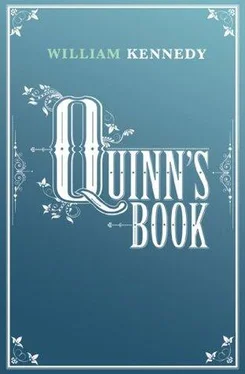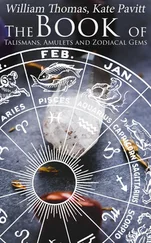I came to this information belatedly, for no one told me what was afoot. Hillegond spoke sweetly but inconsequentially to me, Magdalena was remote and growing more ill, and John the Brawn sold his boat and told me he was done with the river. I asked if that meant I was out of a job and he said, “We’ll see.” He patted my head and said, “Don’t worry, lad. You’ll get your crust of bread.”
Magdalena grew so monstrously ill from her wound that she ceased coming to table and remained abed. Feverish, and in hellish pain, she was the belated victim of her attacker’s vile mouth. Her room’s door was ajar when I once passed it and I peered in to see the wound, having only heard of its festerment second-hand. The bite had swelled into a yellow-and-purplish horror and was oozing a green slime that filled the room with a repellent odor. Hillegond took to burning incense of two kinds in the room: one to keep down the odor, another to ward off the blood devils that threatened Magdalena. But the combination produced a new mélange of smells that was miasmic in its effect on the patient, and so out went the incense, worse grew the stink. The wound was a menacing sight and made me wonder how any of us ever survive our own interior poisons. With ghastly speed the beauteous Magdalena had been transmogrified into a rancid hag, sister death beginning yet again to take residence in her eyes. My brief glances at her satisfied my inquisitiveness, for none but the perverted could have long fastened an eye on that befoulment.
It fell to the Negro servant, Matty, to bathe and dress the wound according to the doctor’s instructions. But when the treatment failed of healing, Matty began a treatment of her own: a poultice of herbs, flowers, dried goat dung, minced crickets, and other improbable ingredients, all boiled, strained, reduced to a powder, mixed with the whites of two duck eggs, and then applied to the infection beneath a bandage made from a fresh bedsheet. Within two days healing began. Within a fortnight Magdalena was growing new tissue, which would in time leave only the slightest evidence of what had once prevailed beneath her skin. I saw the miraculous improvement when I eavesdropped on her lecture to Maud about the evils of Maud’s fast (which I persuaded Maud to rescind, for my sake as well as her own; for of what value would my love be if it had no object upon which to resplend itself?). I saw the radiant Maud standing attentively by the sickbed and my heart sped.
“How dare you put your life in such jeopardy?” said the angry Magdalena. “How dare you, when I am so hounded by fate. Clara, my own sweet serving girl, uselessly drowned, my face almost the ruination of us all, for where would any of us be without it? And you, spiteful child, you take it upon yourself to starve your body, your only salvation. Do you think men care for a woman’s mind, especially the mind of a wicked twelve-year-old like you? Do you think you can live by your wits alone, with no help from the talents you inherited with your flesh? Do you think that silly canal boy can save you from ruination, when he cannot even save himself? He’s a penniless orphan, seeking to steal you away from me with his urchin ways.” (This remark cut me deeply.)
“You fail to see in him the high quality I see,” said Maud (and I recovered immediately from La Última’s cut).
“Child,” said the courtesan, “you have a strong mind, but you are little schooled in the ways of men. And now it is you who must take Clara’s place as my social companion. It is you whom I must dress as I dress myself. It is early for you, but this is an inheritance we must learn to accept.”
“You want me to love men for money?” asked Maud.
“I shall teach you to talk to men, to disarm them of their harsh moods, to entice them into sweetness, to pleasure them. I shall turn you into a songbird, a dancing swan. I shall teach you how to survive this life, child Maudie.”
“Dear Auntie,” said Maud in a tone of affectionate iron, “I am your niece of blood and I love you more than I ever loved my mother. But I won’t be a carnal woman for you, or for us, or for me. I love only Daniel Quinn and I want to give him half or more of my life.”
Was ever a more precisely self-apportioning line uttered by woman? But Magdalena was not as impressed by it as I. “Oh pish, child,” she said. “Pish, pish, pish.”
I saw that I was not a consideration in Magdalena’s plans. John the Brawn continued his dalliance with Hillegond, their periodic thumpings a comic ritual to the entire household, and he paid me small heed. I gravitated to our neighbor Will Canaday, who visited us often, first to rid us of the dead Swede, then to aid in the reburial of Amos’s dusty skeleton, and more mysteriously to spirit away Joshua from his hiding place in the netherworld of the mansion, an event I witnessed without Will’s knowledge during my exploration of the great house (an entity of such enormousness that one needed one’s wits always at full brim to avoid being lost in the maze of corridors, tunnels, staircases, chutes, dropaways, cul-de-sacs and other oddities — unopenable doors without handles or locks — that abounded in the multiple wings, towers, and catacombs of the place).
“Where did you take Joshua?” I asked Will the day after I saw them leaving. “Did you take him to the doctor?”
“Master Quinn,” Will said to me, and I knew from this formality, as well as from his tone, that seriousness was about to descend upon me, “you will put Joshua out of mind and forget you saw him here if you want to preserve his life.”
I nodded instant agreement to this and Will smiled at me. He inquired of my family, which was the beginning of my friendship with this splendid soul, an irregular man of this world, cut to no cloth save his own, neither in his garments, which rarely matched or fit him, nor in his morality, which was vigorous, impious, peculiar, and steadfast.
I told Will I had no family, that I’d gone to work as a canal boy for four months and run away from a master who not only beat me but refused to pay me for my work, that I’d met John the Brawn and liked him by contrast, since he never hit me, that I’d worked with him three months on the canal till his boat sank, and lately as a river rat, but was now a waterless orphan with a most uncertain future.
Will began instantly with his generous counsel, telling me of my need to keep working, fanning my already burning dread of orphanages, which were proliferating not only in the wake of the cholera but as havens for children, safe retreats from parents ready to murder them rather than feed another mouth. Will also decided I should know more about the world than I did (he was appalled that I thought the Mexican War had taken place over the border in Canada) and he counseled me on books to read — storytellers and poets, historians and playwrights of ancient days. I had learned to read from the nuns in school, and liked it well enough. These books from Will were much beyond my ken, but I plunged into them with a duty that in time became the most subtle of my pleasures in this world. Will also saw to it that his newspaper turned up at the Staats mansion every day so I might educate myself. The newspaper’s arrival was anomalous in the home of Hillegond, who cared little for any world outside her own mystical province, even though her son, Dirck, was an editorial employee of Will’s. I loved and devoured the paper, reading of murders and thievery, rapscallions and heroes. I read the commercial notices for pianofortes, ever-pointed pencils, and remedies for evil results arising from early abuse and unhappy contamination. The endless political bickering over issues that I could not follow bored me, but I grew fascinated with the wars between Spaniards and Arabs, between Britons and Kaffirs, between Ch’ing dynasty and the Taiping rebels. I cheered for fugitive slaves in the Carolinas and for the rebellious farmers of Ireland who, under the leadership of one William Smith O’Brien, were defying the English (my father’s father had lost his land to the English). But my partisanship aroused no serious animosity toward the forces that opposed my favored side, I being smug and comfortable, far from such violence. But I did begin to see that violence was the norm of this bellicose world.
Читать дальше












